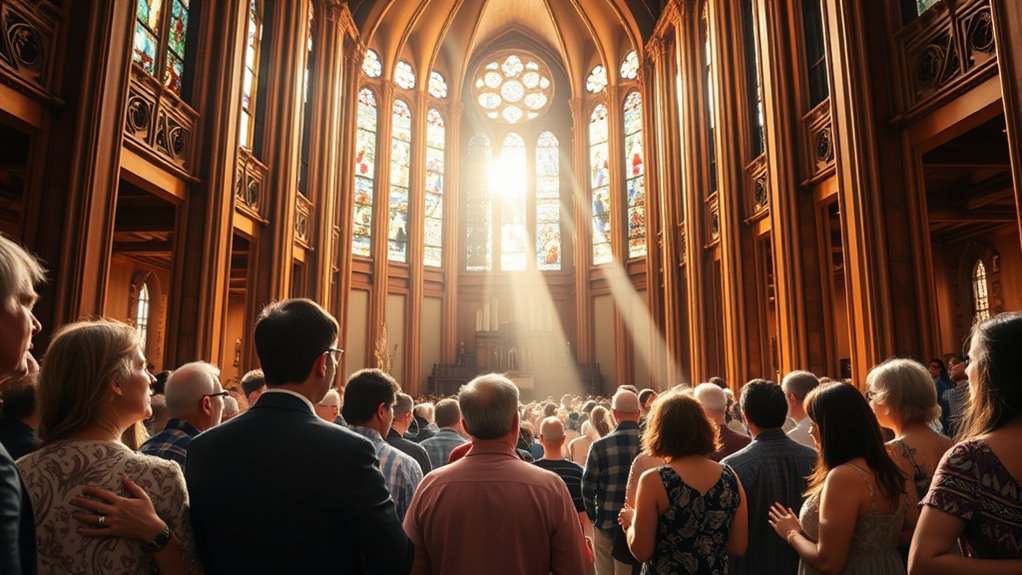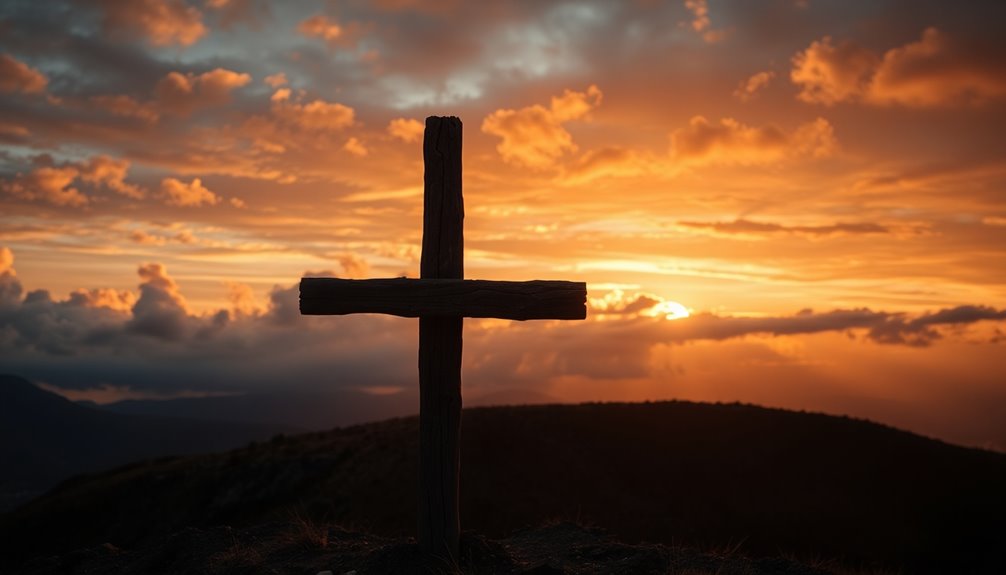The Rapture is a belief that, in the future, Christians will be caught up to meet Christ, but opinions about its timing and meaning vary widely. Some see it as a literal event before tribulation, others view it as symbolic or occurring after. Different denominations and theological traditions interpret key scriptures differently, shaping their views. If you keep exploring, you’ll discover the fascinating debates, historical roots, and cultural influences behind this intriguing concept.
Key Takeaways
- The Rapture is a controversial end-times event where believers are believed to be caught up to meet Christ, based on various biblical passages.
- Interpretations vary: some view it as a literal, sudden event before tribulation, while others see it as symbolic or occurring at different times.
- The concept developed over centuries, gaining prominence in 19th-century dispensationalist teachings and influenced by scriptural ambiguities.
- Christian denominations differ in their beliefs, with Evangelicals often supporting pre-tribulation Rapture, and others favoring post-tribulation or amillennial views.
- Media and popular culture shape perceptions of the Rapture through movies, books, and TV, often emphasizing dramatic and instantaneous disappearance scenarios.
Biblical Foundations and Scriptural References

Have you ever wondered where the idea of the Rapture originates in the Bible? It’s primarily rooted in eschatology theories that interpret certain scriptural references, especially in passages like 1 Thessalonians 4:16-17 and Matthew 24:40-41. However, scriptural ambiguities make it challenging to pinpoint a single, definitive source. Some scholars see these verses as metaphorical, while others view them as literal predictions of a future event. This ambiguity fuels different interpretations among Christians. The key scriptures describe believers being caught up to meet Christ, but the timing and nature of this event remain debated. Understanding these biblical foundations requires examining the texts carefully, recognizing that various perspectives are shaped by how one interprets these scriptural ambiguities.
Historical Development of Rapture Teachings

The concept of the Rapture as a distinct theological event did not emerge fully formed in early Christianity but developed gradually over centuries. Early eschatological theories focused on general resurrection and second coming themes, often using prophetic symbolism from Scripture. It wasn’t until the 19th century that the idea of a pre-tribulation Rapture gained prominence, especially through the influence of dispensationalism. This teaching interpreted prophetic symbolism in a new light, emphasizing a sudden, secret event where believers are taken up before tribulation. Over time, different Christian groups adopted varying understandings of these prophetic signals, shaping the diverse perspectives seen today. Consequently, the development of projection technology reflects a complex interplay between evolving eschatological theories and symbolic interpretations of biblical prophecy. Additionally, the rise of dispensationalist thought helped solidify the concept of a distinct Rapture event in modern Christian doctrine. The pre-tribulation interpretation became particularly popular among certain evangelical circles, further diversifying eschatological views.
Variations Among Christian Denominations

As interpretations of the Rapture evolved over time, different Christian denominations developed their own perspectives on this eschatological event. Some, like many Evangelicals, emphasize the Pre tribulation view, believing believers will be raptured before the tribulation begins. Others, such as Post millennialists, see the Rapture as part of a broader divine plan, occurring after a period of Christian dominance. These varying views influence how you interpret end-times events and your sense of preparedness. The table below summarizes key differences:
| Perspective | Timeline of Rapture | Key Beliefs |
|---|---|---|
| Pre tribulation | Before tribulation | Immediate rescue of believers |
| Post millennial | After millennium | Rapture follows societal change |
Additionally, understanding the fundamentals of sound design can enhance the way these concepts are communicated through various media. Recognizing the diverse interpretations of the Rapture helps believers appreciate different theological perspectives and prepares them for discussions on eschatology. Moreover, exploring the security vulnerabilities associated with digital communication can help individuals better safeguard their information when engaging in religious or theological discussions online. Gaining insight into the biblical context of prophetic events can deepen understanding of how these perspectives align with scripture and divine plan. Studying the aura can also provide a symbolic reflection of spiritual states that relate to eschatological themes, enriching the believer’s perspective on divine timing.
Theological Debates and Interpretations

Theological debates surrounding the Rapture center on differing interpretations of biblical prophecy and eschatology. You’ll find that scholars and theologians interpret eschatological symbolism in diverse ways, leading to varied views on the Rapture’s timing and nature. Some see prophetic interpretations in passages like 1 Thessalonians 4 and Revelation as literal events, while others interpret them symbolically, emphasizing spiritual fulfillment. These differences reflect broader debates about how scripture should be read—literally or figuratively—and what future events might unfold. Disagreements often hinge on the understanding of end-times prophecy, with some advocating a pre-tribulation Rapture and others supporting post-tribulation or amillennial views. These debates shape how you perceive the biblical narrative of the end times and its significance today. Additionally, the interpretation of prophetic dreams can influence individual perspectives on end-times events, as some believe dreams and visions serve as divine guidance in understanding biblical prophecy. Recognizing the varied approaches to interpreting scripture helps clarify why perspectives on the Rapture differ so markedly among believers and scholars alike. The diversity in these interpretations underscores the importance of understanding the broader eschatological framework within which these debates occur.
Cultural Impact and Popular Depictions

Cultural portrayals of the Rapture have considerably shaped public perceptions and fueled curiosity about end-times events. Film portrayals often dramatize the event, emphasizing sudden disappearances and chaos, which influence how many people imagine the Rapture. Pop culture, including books, television, and music, further popularizes these ideas, blending religious themes with entertainment. These depictions tend to magnify the drama and mystery, sometimes diverging from traditional theological views. As a result, many individuals form their understanding of the Rapture based on what they see in movies or hear in songs. This cultural impact creates a shared imagery that can both inform and distort perceptions, making the Rapture a powerful symbol in modern storytelling. Additionally, media representations often simplify complex theological concepts, shaping public perception in ways that may not fully align with religious doctrines. Your view of the end times is often shaped by these widespread media representations. Furthermore, the influence of popular culture can sometimes lead to misconceptions, overshadowing scholarly or doctrinal explanations. The widespread dissemination of these portrayals can also contribute to public misconceptions, affecting how different communities interpret end-times events. Recognizing the cultural influence on end-times narratives can help individuals develop a more nuanced understanding of the theological and cultural dimensions involved, especially considering how creative storytelling impacts perceptions of sacred events.
Frequently Asked Questions
How Do Non-Christian Religions View the Concept of the Rapture?
You might wonder how non-Christian religions see the rapture. Interfaith perspectives often view this concept through their own theological differences, with many not recognizing it at all. For example, Islam, Judaism, and Eastern religions focus on different end-times beliefs or spiritual goals. They typically see the rapture as a Christian-specific idea, emphasizing moral conduct and spiritual development rather than a sudden bodily ascent to heaven.
What Are the Implications of the Rapture for Christian Daily Life?
Did you know that 60% of Christians believe the rapture will happen in their lifetime? This belief influences your daily life, encouraging faith-based practices like prayer and Bible study. It motivates you to stay spiritually prepared, making daily routines more focused on spiritual growth. The rapture’s implications push you to live with a sense of urgency and hope, shaping how you prioritize faith and service in everyday activities.
How Do Secular Scholars Interpret the Rapture Doctrine?
Secular scholars approach the rapture doctrine with theological skepticism and historical critique. They see it as a relatively recent development, often linked to specific religious movements rather than ancient texts. You should know that they question its biblical basis and interpret it as a cultural or symbolic idea rather than a literal event. Their focus is on understanding how such beliefs influence religious and social behaviors, rather than accepting them as factual.
Are There Scientific Perspectives Supporting or Opposing the Rapture?
Think of scientific views as a lighthouse guiding us through foggy seas. Quantum physics and cosmological models explore universe mysteries but don’t directly support or oppose the rapture. You’ll find scientists focus on observable phenomena, not prophetic events. While some see cosmic models as metaphorical, others see no scientific evidence for such spiritual concepts. Ultimately, science and faith often sail on different ships, each seeking its own truth.
How Has the Rapture Influenced Modern Christian Worship Practices?
You notice that the rapture influences modern Christian worship practices by shaping eschatological symbolism in services. Worship music evolution often reflects themes of hope and anticipation, inspiring believers to focus on divine promises. As you participate, you see how these elements encourage a sense of urgency and expectancy, making worship more vibrant and future-oriented. This connection deepens your understanding of faith’s role in shaping contemporary Christian practices.
Conclusion
Understanding the rapture helps you see its significance across faiths and cultures. Did you know that nearly 70% of Americans believe in some form of the rapture or end-times event? This shows how deeply it resonates with many. Whether you see it as literal or symbolic, exploring these perspectives invites you to reflect on hope, faith, and the future. Embrace this journey of understanding—it’s a powerful step toward personal and spiritual insight.










